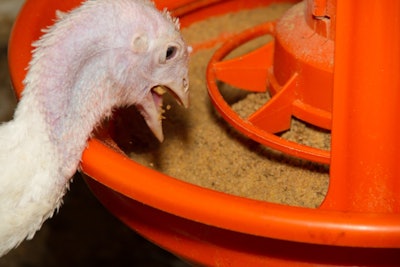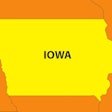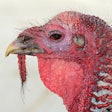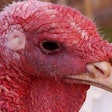
Recently named the CEO of Northern Pride, Hunter Miller was one of a handful of agrifood company leaders to take part in the second of two Perspectives on Protein Sustainability webinars, hosted by the Agricultural Utilization Research Institute on November 8.
During the webinar, Miller revealed what he thought was one of the biggest challenges for the turkey industry and the greater poultry industry. He also shared insights on the future of poultry production, labeling and weighing whether water chilling or air chilling is a more environmentally friendly.
Labor intensity of poultry production
Miller was asked what he thought were the biggest global challenges associated with helping turkey becoming more widely adopted as a primary protein source.
He said maintain growers was one of the biggest, stating that being a turkey farmer has challenges that being a row crop farmer doesn’t.
“It’s a difficult job. It’s highly competitive, and the margins sometimes just aren’t there for the farmers, and they go to other (agricultural sectors). Row crop farming has a lot less risk and less work. They’re highly mechanized now. The equipment keeps getting larger and larger, so it doesn’t require a lot of labor to do that, where with poultry it is the complete opposite. You’re heavily reliant on skilled labor in these houses (who need to know) when to feed the birds and address different issues in houses,” said Miller.
“So, it’s quite difficult to manage and you see more and more people getting out just because of the challenges, globally.”
Production locations could change
Despite saying that many farmers might be leaving the poultry industry, he did offer assurance that poultry production as a whole is not going away.
“I don’t think you’ll see us going away anytime soon,” Miller said. “It may shift production of where it’s produced, but poultry is still the No. 1 consumed protein in the world, and the cheapest, so we’ll be around. It just depends on where we get our poultry.”
Miller said U.S. consumers of the future could be getting their poultry from domestic producers. But they could also get their poultry from South America or other markets, he added.
“I hope that’s not the case, but those are things that I see facing us and the future,” he said.
 Hunter MillerAURI webinar screenshot
Hunter MillerAURI webinar screenshot
Labeling and certifications
Northern Pride, headquartered in Thief River Falls, Minnesota, is owned by about 20 producer owners and processes around 5 million turkeys annually. The cooperative formed in 1989 when the owners purchased its processing plant from Land O’Lakes.
Presently the 18th largest turkey producer in the United States, Northern Pride has seen many changes since its formation.
Miller said the cooperative now raises turkeys according to different production standards, all to meet customer demands.
“We package different classifications of turkeys – from conventionally raised, no antibiotics ever and organic,” he said.
“The customer’s willing to pay for that. In most cases, they’re very concerned with animal husbandry and animal welfare, and we’re even seeing more interest in free range.”
But Miller said not all customers truly understand the differences associated with different labels and claims.
“A lot of the consumers still don’t understand what the claims mean. They just have a perception that it’s better for them health-wise, which can be the case, and sometimes, (it isn’t). It’s just a different way to raise the animal. I’m not going to say one is better than another. It’s just different,” he said.
Another webinar participant compared some products to a merit badge sash of a Boy Scout, adding that he felt certain labels that require certain certifications seemed excessive, and a product with all of those certifications can be overwhelming to the consumers reading the packaging.
Miller agreed and said it can also be tough on the turkey producers and processors.
“The consumer’s overwhelmed with all of these different meanings,” he said. Honestly, are they going to take the time to research each one of them and understand what they mean? It’s another cost for our producers, our farmers, because they have to get through these third-party audits so we can validate these claims. It’s just more costs added, and consumers paying for it again.”


















